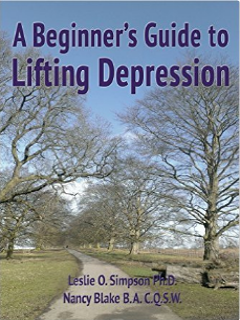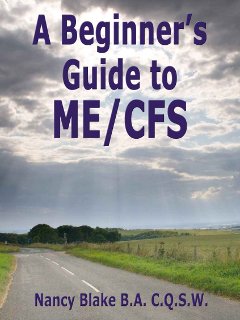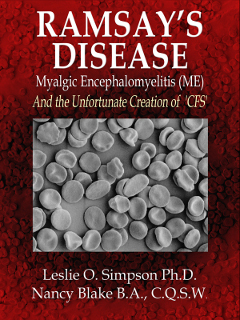A Beginner's Guide to Lifting Depression
Authors: Nancy Blake, BA, CQSW, Leslie O. Simpson, Ph.D.
A Beginner's Guide to Lifting Depression offers two approaches which you are unlikely to find elsewhere. Doctors aren't taught hemorheology, the physical properties of blood. But most chronic disorders, including depression, are characterised by blood flow problems, and there are relatively simple and available supplements and medical treatments which can improve blood flow and lift mood. Your counsellor or psychotherapist is very likely to offer you CBT (Cognitive Behaviour Therapy), which is widely used and very popular. But it only touches the surface.
That inner critical voice - CBT tells you not to believe it. NLP teaches you how to control it. (Why argue with a radio - change the channel , or turn it off!) This Beginner's Guide includes two interwoven strands of information and suggestions: Les Simpson's thorough and systematic study of depression, in particular the evidence for blood flow problems and treatments which can address these; and Nancy Blake's insights and practical techniques based on years of using NLP to help depressed clients 'get their lives back.'
Depression may tell you otherwise, but you deserve to enjoy your life. We hope we can help.
A Beginner's Guide to ME/CFS
Authors: Nancy Blake, BA, CQSW, Leslie O. Simpson, Ph.D.
The Beginner's Guide to ME has been written to counteract the bad advice given to people who have ME in the UK and elsewhere, and I believe it is essential reading for people who have this illness and for their carers and advocates. Our situation really is an emergency, and it is not getting better.
If you have ME, you know that you are physically ill. You know that you can't do much because factors within your body are preventing it, not because you are 'paying undue attention to normal physical sensations'. Exercise is known to make your symptoms worse, yet you are offered (or coerced into) treatment by cognitive behaviour therapy (CBT) directed at changing your 'false illness belief' that you have a physical illness (you do) and graded exercise therapy (GET), directed at getting you to exert yourself more so that you can find out that you are 'only imagining' that exertion makes you worse. (It does.)
The 'false beliefs' are those of the psychiatrists, whose influence has been used to impose these treatments upon us, and who, as I write, are doing all they can to get this illness included as a psychiatric condition (chronic somatoform symptom disorder) in the forthcoming edition of the Diagnostic and Statistical Manual of psychiatric conditions (DSM V).
In 1986, when I first became ill, the literature given out by the ME Association stated that the best prognosis was for those patients who were encouraged to take complete rest, right from the beginning of the illness. As the illness gradually began to recede, you were told to take great care to stay well within the limit of exertion that you could cope with. And you were told that if you had had the illness for two years, there was a 50% chance that you would be recovered within six years.
Since then, the influence of the psychiatric lobby has largely prevailed, and we are being told that CBT and GET are the only 'evidence-based' treatments that show promise, and these are the treatments offered by our 'specialist centres', ME is now considered likely to follow a downward path towards severe disability, so much so that some scientists think it may, after all, be a 'progressive' condition, one that in its nature gradually becomes worse.
I think that if people are being offered treatments which are based on a false idea that the illness is psychological, and being coerced into 'treatment' based on doing something that is known to make the illness worse, it is hardly surprising that people who have it are, by and large, getting worse. The technical term for this is 'iatrogenic' - being made worse by medical treatment.
It seems really urgent to get the right information out there - that if what you've got is ME, you must rest. But we live in a culture that regards exercising as the be-all and end-all for our health, and thinks the right way to respond to illness is to 'fight it'. If you don't, you are thought of, and may think of yourself, as just being a wimp, just giving in. People who have ME have a very bad press, and it is completely undeserved, the opposite of the truth. You need to have immense courage, in the face of all this pressure, to defy it, and just lie down. For a very long time. But that is the only way to create a window for the possibility of ultimately getting better.
As I've said elsewhere, if you have ME, you are most likely to be energetic, ambitious, generally optimistic, ploughing onward through illness or minor injuries, the farthest thing from being the hypochondriac of popular media perception. You need every bit of help and encouragement you can get to give yourself a chance to get better - to feel OK that resting is the right thing to do. And there are other things which can help, too, based on Les Simpson's research and recommendations concerning shape changes in the red-blood cell population.
This is why I have written my little book 'A Beginner's Guide to ME', and I hope that the information and encouragement in it will offer some genuine help to people who have ME, and people who may be close to someone who has it (if you're helping, you are a star!).
More little books will follow, for those who want to learn more about the history of ME, more about Les Simpson's research into the effect of and treatments for red bloocd cell population changes, the progress of the controversy over labelling and categorising, how psychotherapy can help the patient deal with having the illness, and so on.
In the meantime, people with ME do need the information and encouragement in this first little book, and once you've read it, I think you may agree.
If you already interested in more extensive information about ME, then get 'Ramsay's Disease', for a fuller personal account, a detailed history of medical and political developments from the early 1900's, a detailed account of Dr. Simpson's own research and recommendations, his comments on various diagnostic guidelines, and my explanation about the use of medical terminology both to explain and to confuse the issues concerning the nature of this illness.
Ramsay's Disease - Myalgic Encephalomyelitis (ME) and the Unfortunate Creation of 'CFS'.
Authors: Leslie O. Simpson, Ph.D., Nancy Blake, BA, CQSW
Dr. Simpson is a researcher who has devoted more than thirty years to the study of haemorheology - the physical properties of blood. It is a medical given that red blood cells are biconcave discocytes - perfectly round and flat, with a dimple on both sides. This shape enables them to 'deform' (curl up) enough to travel through tiny blood vessels (capillaries) much narrower. The role of the red blood cells is to carry oxygen to every cell in our body, and remove waste products. If this process fails, symptoms will occur in the areas of the body most sensitive to oxygen deprivation - the muscles, cognitive areas of the brain, and the endocrine system which regulates most of our bodily functions. People who have ME/CFS will recognise the failure of normal functioning in muscles, problems of cognition (''brain fog'') and in regulation of body temperature, appetite, sleep rhythms. Dr. Simpson's studies, involving micrographs of immediately fixed samples of blood show that in ME/CFS, the red blood cell population becomes dominated by a proportions of cells which have shapes other than biconcave discocyte, are therefore stiffened, and unable to traverse the microcirculation. This account does not explain the initial cause or causes of this debilitating illness, but it does explain how the symptoms are created.
The good news is that there are a number of easily obtainable supplements which can improve the flexibility of the red blood cells if taken in sufficient dosage. These include fish oil, 6g per day, genuine Evening Primrose Oil, 4 g per day (following research that appeared to show that EPO was not effective, it was discovered that many products marketed as EPO are not, in fact, genuine), Vitamin B12 as hydroxocobalamin, and pentoxyfilline.
Dr. Simpson is clear that for reasons unknown, not everyone will respond to one or another of these, and suggests trying them until you find the one that helps you the most. He has interviewed, researched and advised members of ME and CFS groups in the U.S, U.K., Canada, Australia, and his native New Zealand, and had hundreds of reports from people who had been helped by these recommendations.
The bad news is that his ideas, along with most research in the field of haemorheology, is ignored by the medical profession and the medical textbooks, so that sufferers from a number of other chronic, illnesses, as well as ME, are deprived of information which could make a major difference to their well-being.
Nancy Blake is a UKCP-Accredited Neurolinguistic psychotherapist, who became very ill with ME in 1986. Now virtually fully recovered, she puts forward a strong case against the psychiatric labelling of ME/CFS, and makes recommendations, based on the physiological nature of this illness, for people who have it, for doctors, and for public policy.
'Ramsay's Disease' is now available on Amazon Kindle. It will be produced in paperback within the next few weeks. It will be followed by a shortened version, 'Common Sense About ME', also to appear within the next few weeks.
Nancy is also working on a book on DIY Family Therapy, entitled 'Friendly Conversations for Families that are Stuck', and will be producing a book of poetry, 'Dream Landscapes'. Another project is producing two short books based on talks that she has presented to residents of The Gables, a residential complex in Ojai, California, where her mother spent twenty eight happy years. And, very belatedly, she plans to write about research she undertook into mental health facilities in the then South Humberside, U.K. in the 1980's.


